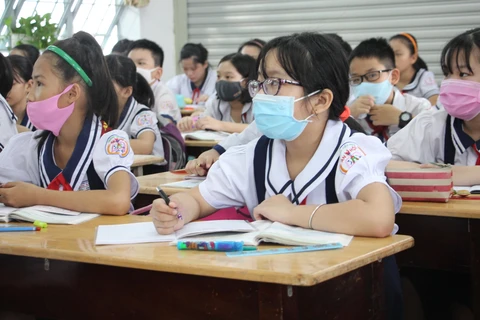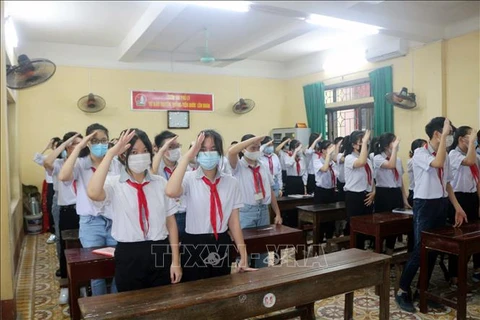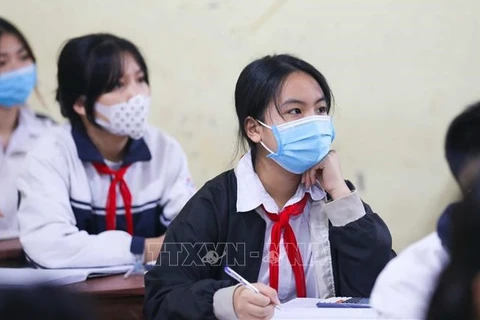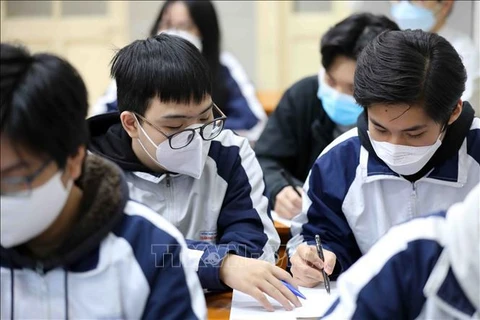Hanoi (VNA) – Most localities nationwide are planning to resume in-person learning after the Lunar New Year holiday, a necessary move to avoid consequences of prolonged school shutdowns which would affect an entire generation for many decades to come, many experts said.
Simone Vis, Chief of Education at UNICEF Vietnam, said the COVID-19 pandemic has led to learning disruptions around the globe, causing the worst educational crisis in history. The pandemic and school closures have not only harmed children’s health and mental safety, increased domestic violence and child labour but also substantially affected students’ learning.
She noted it is obvious that children have studied less amid the pandemic. This learning loss could make a generation of global students lose 17 trillion USD in income during their life.
To minimise long-term impacts, Vietnam should focus on dealing with such losses, she suggested, noting that UNICEF will work with the Ministry of Education and Training to carry out a learning recovery plan which aims to ensure that children and teenagers can go to school and achieve a learning capacity level at least equivalent to that of the pre-pandemic generations.
UNICEF also recommended schools reserve much time for their students to engage in social interactions and social-emotional learning.
Dr. Hoang Trung Hoc, head of the psychology - education faculty at the National Academy of Education Management, cited a study of over 20,000 students nationwide after six months of online learning as revealing that 65.1 percent of them show symptoms of stress at different levels, from mild, moderate, to severe and very severe.
He held that one effective solution is to quickly let students return to school, but schools should spend the first week to help students adapt and handle emotional and behaviour issues.
Echoing the view, Dang Tu An, Director of the Vietnam Innovation of General Education Foundation, said apart from low educational effectiveness, online learning has also made students unable to practice face-to-face communication and lose connectivity with their friends, teachers, and society, resulting in tiredness and stress for both teachers and students, as well as parents.
Since October 2021, the country has changed its anti-pandemic strategy under the Government’s Resolution No. 128. However, some localities have yet to take brave and creative actions to resume in-person learning while many schools have not realised the consequences of prolonged closures.
It is necessary to reform the educational management mechanism, which should give autonomy to schools and help them tackle difficulties and be determined to reopen, according to An./.
Simone Vis, Chief of Education at UNICEF Vietnam, said the COVID-19 pandemic has led to learning disruptions around the globe, causing the worst educational crisis in history. The pandemic and school closures have not only harmed children’s health and mental safety, increased domestic violence and child labour but also substantially affected students’ learning.
She noted it is obvious that children have studied less amid the pandemic. This learning loss could make a generation of global students lose 17 trillion USD in income during their life.
To minimise long-term impacts, Vietnam should focus on dealing with such losses, she suggested, noting that UNICEF will work with the Ministry of Education and Training to carry out a learning recovery plan which aims to ensure that children and teenagers can go to school and achieve a learning capacity level at least equivalent to that of the pre-pandemic generations.
UNICEF also recommended schools reserve much time for their students to engage in social interactions and social-emotional learning.
Dr. Hoang Trung Hoc, head of the psychology - education faculty at the National Academy of Education Management, cited a study of over 20,000 students nationwide after six months of online learning as revealing that 65.1 percent of them show symptoms of stress at different levels, from mild, moderate, to severe and very severe.
He held that one effective solution is to quickly let students return to school, but schools should spend the first week to help students adapt and handle emotional and behaviour issues.
Echoing the view, Dang Tu An, Director of the Vietnam Innovation of General Education Foundation, said apart from low educational effectiveness, online learning has also made students unable to practice face-to-face communication and lose connectivity with their friends, teachers, and society, resulting in tiredness and stress for both teachers and students, as well as parents.
Since October 2021, the country has changed its anti-pandemic strategy under the Government’s Resolution No. 128. However, some localities have yet to take brave and creative actions to resume in-person learning while many schools have not realised the consequences of prolonged closures.
It is necessary to reform the educational management mechanism, which should give autonomy to schools and help them tackle difficulties and be determined to reopen, according to An./.
VNA

























